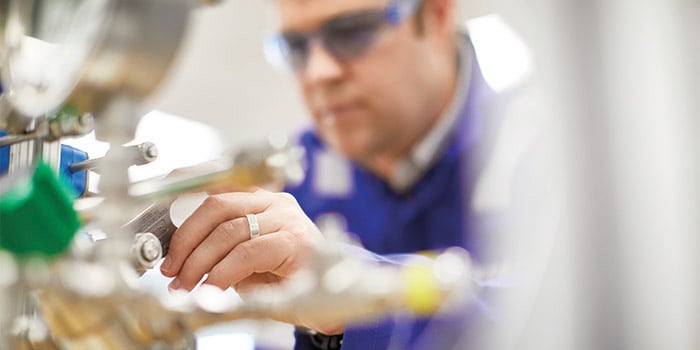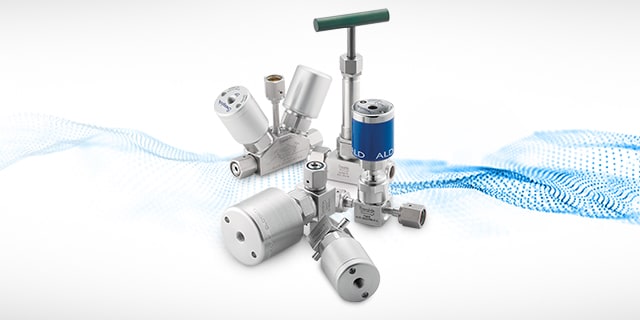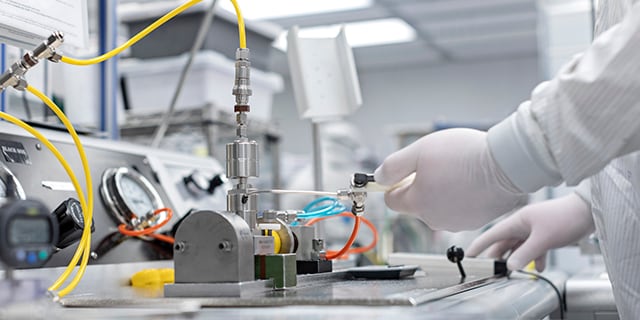The Benefits of On-Site Field Engineering Support for Semiconductor Chip Manufacturing

How Engineering Assistance Can Help Keep Semiconductor Production Humming: A Q&A With Global Field Engineering Manager Greg Mlynar
With the need for shorter supply chains and material sourcing, availability and shipping resolutions, and the rapid rate at which new fabs are being constructed, chip manufacturers need solutions to keep up. And as the standardization of processes and facilities becomes more important and demand for semiconductor chips continues to grow, so does the need for engineering expertise and the localization of materials.
It’s part of why third-party engineering assistance can be invaluable as an integrated aspect of new fab operations teams. In particular, critical high-purity fluid systems can have a major impact on the fab’s ability to manufacture as efficiently as possible—and in-house expertise on how to optimize such systems may not always be available.
Swagelok’s Greg Mlynar, who leads a semiconductor field engineering team, says that semiconductor manufacturers can use outside expertise when building new fabs or revamping existing ones. He sat down for an interview with Swagelok Reference Point to explain why.
Swagelok Reference Point (SRP): What are the key areas in which semiconductor manufacturers can typically use engineering assistance?
GM: Most semiconductor manufacturers are looking to enhance their processes in any way they can to improve productivity, reliability, and efficiency. And that’s where third-party specialists can offer expertise, especially with fluid delivery systems and applications. Three core areas are of particular importance: specifying the right high-purity components for the critical equipment, making improvements to existing fluid systems that will maximize performance, and maintaining on-site fluid systems to ensure consistent throughput.
Because no two semiconductor manufacturing strategies are exactly the same, having a third party that can come in, evaluate the specific needs of your operation, and recommend a tailored solution based on your desired outcomes can lead to significant improvements.
SRP: Can you explain some of those customized solutions? How are they developed?
GM: Most fabs are looking for support around existing systems to make necessary adjustments or optimizations. For example, our team of field engineers will review specific systems along with all associated cables, fittings, and connections, then map out those systems. They’ll identify opportunities to change or enhance them and offer insights and reporting to customers focused on custom solutions and assembly recommendations.
Storage Shed
Depending on your supplier’s capabilities, further support may also be available for designing and specifying for projects; compliance assurance with existing codes and regulations; analyzing the operation of and delivering maintenance for chemical, process gas, water, and waste collection systems; and performing failure mode and effect analyses (FMEA) on facilities’ systems, support system startup, optimization, and shutdown functions.
SRP: Why is this kind of support so important?
GM: Because demand is so high in the industry right now, system failures, breakdowns, or other emergencies can spell financial peril for semiconductor fabs. An outside engineering team, like the field engineering program we have at Swagelok, can provide direction for restoring operations quickly and safely, implement training for operations staff and other personnel, and much more. But it’s important in getting new facilities online too. Our team, for instance, is increasingly focused on helping our customers with new fab construction. We’re involved in base builds, installation of equipment and tools, as well as all necessary startup installations required by a given build.
SRP: What kinds of skill sets are important to look for when vetting a third-party engineering team?
GM: Technical backgrounds are beneficial due to the precise nature of semiconductor manufacturing. Electrical, mechanical, and chemical engineering disciplines are highly applicable to the industry. These are some of the skills that Swagelok field engineers are able to offer our semiconductor customers around the world.
A depth of understanding on how and why certain products and solutions may be ideal for semiconductor applications is also important. These are highly demanding systems that handle harsh chemistries; off-the-shelf components that work in general industrial applications aren’t always going to be ideal here. A thorough knowledge of materials science, corrosion types, and corrosion-resistant alloys are very helpful when working through challenges inherent to semiconductor production.
“Working with specialized fluid system engineering teams can offer a huge time saving. And when time is money, that makes a big difference. ”
SRP: What are some of the biggest benefits that can be realized by working with a specialized fluid system engineering team?
GM: For starters, it’s a huge timesaver. And when time is money, that makes a big difference. Additionally, with a lot of emphasis being placed on getting new fabs up and running, products and services are being expedited because—think about it—a missing fluid system could halt the entire installation of a $5 billion to $10 billion fab. That means nothing is running, no work is being done, and no money is being made. That’s where specialized engineers can offer the greatest customer benefit—installing the appropriate products to get systems up and running, then reviewing those systems and making recommendations for future expansions and modifications.
Semiconductor fabs stand to gain significant benefit from the specific insights and engineering knowledge that specialized teams can provide. Interested in learning more? The Swagelok field engineering team has a depth of experience integrating with semiconductor manufacturers as they build new fabs or optimize existing ones, helping them overcome fluid system challenges in the pursuit of optimized production. Contact a local sales and service center for more information.
Greg Mlynar has an engineering background, with a bachelor’s degree in chemical engineering, a master’s in microelectronics engineering and an MBA. He has spent 25 years working in the semiconductor industry and joined Swagelok in 2020 as the global semiconductor field engineering manager. In this role, Greg leads Swagelok’s international team of semiconductor field engineers who work with fabs, OEMs, and materials suppliers around the world. He also coaches and mentors field engineer team members on technical services and sales and has authored a semiconductor field engineering training program for Swagelok staff.
Related Articles

How to Optimize Semiconductor ALD Processes
Learn why specialized valves and a well-designed valve control system can enable more efficient and reliable atomic layer processes and provide semiconductor manufacturers new tools for process optimization.

How to Solve Top ALD and ALE Semiconductor Processing Challenges
ALD and ALE semiconductor production processes come with some inherent challenges and complexities. Learn how the right selection of process valves can help you overcome them.

Why Fast Support Matters for Semiconductor Fabs
Reducing total cost of ownership for semiconductor fabs is possible by working with suppliers that can provide fast, local support for critical challenges. Find out how Swagelok can help.

